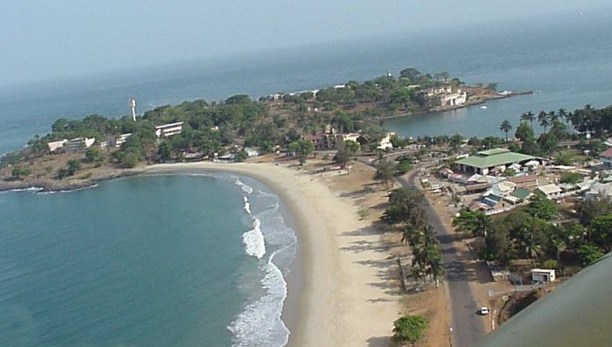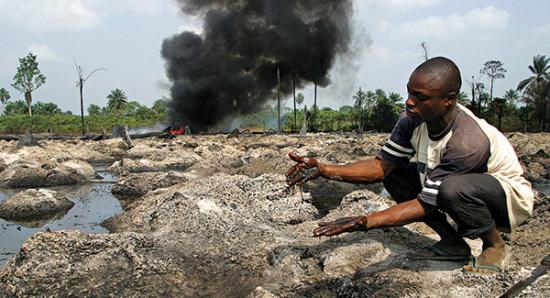GCLME countries seek regional policy on use of oil dispersants
Accra, 22 June – Reach back momentarily to 1989 and the Exxon Valdez tanker oil spill. The disaster alerted the world to possible future accidents of this nature. Since then there have been many more, the most recent and significant of which was the 2010 Deepwater Horizon accident in the Gulf of Mexico.
These spills attracted extensive worldwide media attention, no doubt partly due of their shock value. Not so the long-time scourge of oil pollution in Nigeria’s Niger Delta, a vast network of creeks and mangroves that forms part of the Guinea Current Large Marine Ecosystem. Residents in the Delta’s labyrinth of creeks have been enduring the effects of oil spills for decades. Their plight has attracted far less glaring media attention, and then usually only riding on the back of stories about the armed rebellion and kidnapping of oil workers in the area.
The Niger Delta, Angola’s Cabinda Province and Port Gentil, Gabon’s second city, host some of Africa’s largest oil field and are prone to sill. Some oil spills in the Niger Delta have been accidental; others have been due to the illegal tapping of pipelines. This has turned vast areas of once near-pristine land into vast fields of sludge, destroying marine life, coastal habitats and livelihoods.
Now, with growing oil exploration in new concessions along the West and Central African coast, realization of the increased probability of spills has heightened. In the Guinea Current region Côte d’Ivoire, Guinea-Bissau, Sierra Leone, Liberia, as well as Sao Tome and Principe are exploring and hope to join Angola, Equatorial Guinea, Ghana and Nigeria as major producers. Correspondingly with this increased activity, there exists a greater possibility of more oil spills. The ability to prevent such disasters and manage them if they do occur is a major preoccupation of scientists and individual governments in the region.
However, the response to any transboundary oil spill would require collective action. One measure is the use of dispersants in managing oil spills, for which a regional policy is being sort. This was the subject of a regional workshop on dispersants use policies in West and Central Africa held in Accra, Ghana, 22-24 June.
“Your presence at this workshop underscores the seriousness of your countries readiness and willingness to our joint mission of ensuring a clean and friendly marine environment in our sub region,” Dr Stephen Maxwell Donkor, Executive Secretary of the Interim Guinea Current Commission and Regional Coordinator of the Guinea Current Large Marine Ecosystem (GCLME) project, said when opening and welcoming delegates to the workshop.
The workshop is organized with the International Maritime Organization (IMO) under an agreement with UNIDO, as executing agency for GCLME project.
In his opening remarks, the chairman for the Global Initiative for West and Central Africa, Dr Thomas Coolbaugh, said despite the existing national contingency plans, these needed to be tested and evaluated regularly “to be fully effective”.
Whereas 13 of the 16 Interim Guinea Current Commission countries have detailed the conditions and use of dispersants in their National Oil Spill Contingency Plans, a regional policy on the types and conditions for use of chemicals is missing. The workshop is also expected to initiate regional policy on the use of dispersants and on ways of harmonizing national policies on the issue.
Yet, some form of this exists. In 2003, Dr Donkor said, the West and Central Africa launched an aerial surveillance and dispersant service that has responded to several incidents. GI WACAF has the “key innovative feature” of promoting public-private partnership for oil spill preparedness, response and cooperation. GI WACAF Project Manager Romain Chancerel said at the opening that the project, jointly funded with International Maritime Organization and eight oil company members, through the International Petroleum Industry Environmental Conservation Association (IPIECA), had trained at least 3,000 persons, from 2006 to 2011, in spill response.
“From a results-based perspective, the overall preparedness indicator has increased by 30 per cent since 2006,” he said.
The workshop has attracted 46 participants drawn from maritime organizations, and related institutions from all the CGLME member countries, ministries, departments, agencies, oil firms (Shell, Total , Chevron), the private sector and others identified by the International Maritime Organization, as well as all members of the Guinea Current Large Marine Ecosystem.
Delegates at the meeting will discuss their national oil spill and explore the way to develop and, eventually, implement a common regional approach, given the potential scale of an oil spill disaster.
By Mr. Olu Sarr, Interim Guinea Current Commission/Guinea Current Large Marine Ecosystem
Stay with Sierra Express Media, for your trusted place in news!
© 2011, https:. All rights reserved.





